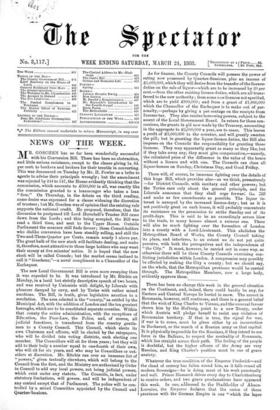As for finance, the County Councils will possess the power
of rating now possessed by Quarter-Sessions, plus an income of 25,600,000, which they will derive from the transfer of the licence- duties on the sale of liquor—which are to be increased by 20 per cent.—from the other existing licence-duties, which are all trans- ferred to the new authority; from some new licences not specified, which are to yield £800,000; and from a grant of £1,800,000 which the Chancellor of the Exchequer is to make out of per- sonalty,—perhaps by giving a percentage on the receipts from Income-tax. They also receive borrowing powers, subject to the assent of the Local Government Board. In return for these con- cessions, the grants in aid now made by the Treasury, amounting in the aggregate to 22,000,000 a year, are to cease. This leaves a profit of 23,600,000 to the counties, and will greatly sweeten the pill; but in granting the liquor-licence duties, the Bill also imposes on the Councils the responsibility for granting those licences. They may apparently grant as many as they like, but if they take away any, they must give compensation,—namely, the calculated price of the difference in the value of the house without a licence and with one. The Councils can close all liquor-houses on Sunday, Christmas Day, and Good Friday.


































